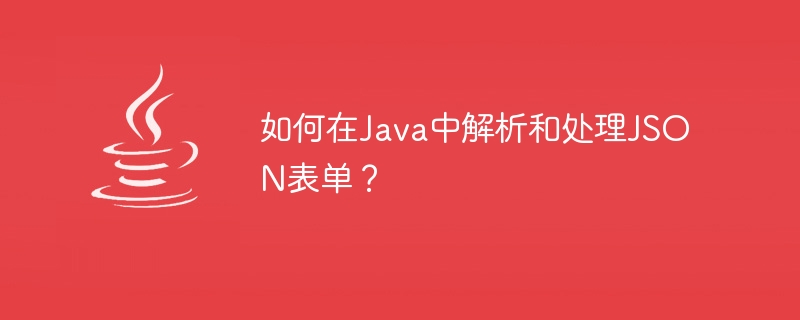How to parse and process JSON forms in Java?

How to parse and process JSON forms in Java?
With the development of the Internet, JSON (JavaScript Object Notation) has become a format widely used for data transmission and interaction. In Java development, we often need to parse and process JSON forms. This article will introduce how to use common JSON libraries in Java to parse and process JSON forms, with corresponding code examples.
1. Import JSON library
First, we need to import a suitable JSON library. Common JSON libraries include JSON-java, Jackson, Gson, etc. In this article, we will use the JSON-java library, which is a JSON library officially maintained by Java. It is easy to use and powerful.
-
Add the following dependencies in the pom.xml file:
<dependency> <groupId>org.json</groupId> <artifactId>json</artifactId> <version>20210307</version> </dependency>
Copy after login Import related libraries in the Java class:
import org.json.JSONArray; import org.json.JSONObject;
Copy after login
2. Parse JSON form
The JSON form is usually a string, and we need to parse it into a Java object for operation and processing.
Parse a simple JSON form:
String jsonStr = "{"name": "John", "age": 25, "city": "New York"}"; JSONObject jsonObj = new JSONObject(jsonStr); String name = jsonObj.getString("name"); int age = jsonObj.getInt("age"); String city = jsonObj.getString("city"); System.out.println("Name: " + name); System.out.println("Age: " + age); System.out.println("City: " + city);Copy after loginParse a JSON form containing an array:
String jsonStr = "{"students": [{"name": "John", "age": 25}, {"name": "Bob", "age": 28}]}"; JSONObject jsonObj = new JSONObject(jsonStr); JSONArray students = jsonObj.getJSONArray("students"); for (int i = 0; i < students.length(); i++) { JSONObject student = students.getJSONObject(i); String name = student.getString("name"); int age = student.getInt("age"); System.out.println("Name: " + name + ", Age: " + age); }Copy after login
3. Generate JSON form
In addition to parsing JSON forms, sometimes we also need to generate new JSON forms in Java.
Generate a simple JSON form:
JSONObject jsonObj = new JSONObject(); jsonObj.put("name", "John"); jsonObj.put("age", 25); jsonObj.put("city", "New York"); String jsonStr = jsonObj.toString(); System.out.println(jsonStr);Copy after loginGenerate a JSON form containing an array:
JSONArray students = new JSONArray(); JSONObject student1 = new JSONObject(); student1.put("name", "John"); student1.put("age", 25); JSONObject student2 = new JSONObject(); student2.put("name", "Bob"); student2.put("age", 28); students.put(student1); students.put(student2); JSONObject jsonObj = new JSONObject(); jsonObj.put("students", students); String jsonStr = jsonObj.toString(); System.out.println(jsonStr);Copy after login
The above are some basic operations for parsing and processing JSON forms in Java. By using a suitable JSON library, we can easily parse JSON forms into Java objects and manipulate them, as well as generate new JSON forms. I hope this article will help you process JSON forms in Java development.
Summary
This article introduces the basic steps for parsing and processing JSON forms in Java and provides corresponding code examples. In actual development, we can choose the appropriate JSON library to operate JSON data according to business needs. By using the JSON library properly, we can parse and process JSON data more efficiently. I hope this article can help you better handle JSON forms in Java development.
The above is the detailed content of How to parse and process JSON forms in Java?. For more information, please follow other related articles on the PHP Chinese website!

Hot AI Tools

Undresser.AI Undress
AI-powered app for creating realistic nude photos

AI Clothes Remover
Online AI tool for removing clothes from photos.

Undress AI Tool
Undress images for free

Clothoff.io
AI clothes remover

AI Hentai Generator
Generate AI Hentai for free.

Hot Article

Hot Tools

Notepad++7.3.1
Easy-to-use and free code editor

SublimeText3 Chinese version
Chinese version, very easy to use

Zend Studio 13.0.1
Powerful PHP integrated development environment

Dreamweaver CS6
Visual web development tools

SublimeText3 Mac version
God-level code editing software (SublimeText3)

Hot Topics
 1379
1379
 52
52
 How does Java's classloading mechanism work, including different classloaders and their delegation models?
Mar 17, 2025 pm 05:35 PM
How does Java's classloading mechanism work, including different classloaders and their delegation models?
Mar 17, 2025 pm 05:35 PM
Java's classloading involves loading, linking, and initializing classes using a hierarchical system with Bootstrap, Extension, and Application classloaders. The parent delegation model ensures core classes are loaded first, affecting custom class loa
 How do I implement multi-level caching in Java applications using libraries like Caffeine or Guava Cache?
Mar 17, 2025 pm 05:44 PM
How do I implement multi-level caching in Java applications using libraries like Caffeine or Guava Cache?
Mar 17, 2025 pm 05:44 PM
The article discusses implementing multi-level caching in Java using Caffeine and Guava Cache to enhance application performance. It covers setup, integration, and performance benefits, along with configuration and eviction policy management best pra
 How can I use JPA (Java Persistence API) for object-relational mapping with advanced features like caching and lazy loading?
Mar 17, 2025 pm 05:43 PM
How can I use JPA (Java Persistence API) for object-relational mapping with advanced features like caching and lazy loading?
Mar 17, 2025 pm 05:43 PM
The article discusses using JPA for object-relational mapping with advanced features like caching and lazy loading. It covers setup, entity mapping, and best practices for optimizing performance while highlighting potential pitfalls.[159 characters]
 How do I use Maven or Gradle for advanced Java project management, build automation, and dependency resolution?
Mar 17, 2025 pm 05:46 PM
How do I use Maven or Gradle for advanced Java project management, build automation, and dependency resolution?
Mar 17, 2025 pm 05:46 PM
The article discusses using Maven and Gradle for Java project management, build automation, and dependency resolution, comparing their approaches and optimization strategies.
 How do I create and use custom Java libraries (JAR files) with proper versioning and dependency management?
Mar 17, 2025 pm 05:45 PM
How do I create and use custom Java libraries (JAR files) with proper versioning and dependency management?
Mar 17, 2025 pm 05:45 PM
The article discusses creating and using custom Java libraries (JAR files) with proper versioning and dependency management, using tools like Maven and Gradle.




